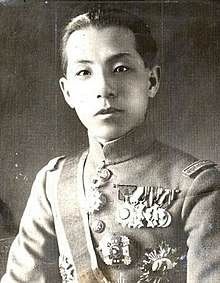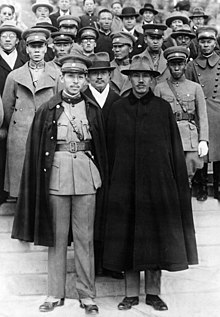Chang Hsueh-liang
You can help expand this article with text translated from the corresponding article in Chinese. Click [show] for important translation instructions.
|
Chang Hsueh-liang | |
|---|---|
張學良 | |
 Chang in 1928 | |
| Warlord of Manchuria | |
| In office June 4, 1928 – December 26, 1936 | |
| Preceded by | Zhang Zuolin |
| Succeeded by | Office abolished |
| Personal details | |
| Born | June 3, 1901 Chinese |
| Spouses | Yu Feng-chih
(m. 1916; div. 1964)Edith Chao Chang
(m. 1964; died 2000) |
| Domestic partner | Gu Ruiyu (1924–1931) |
| Children | 5 |
| Parent |
|
| Relatives | Zhang Xueming (brother) |
| Awards | Order of Rank and Merit Order of Wen-Hu Order of the Sacred Treasure Order of Blue Sky and White Sun |
| Nickname | Young Marshal |
| Military service | |
| Allegiance |
|
| Branch/service | |
| Rank | General of the Army[citation needed ] |
| Commands | Northeast Peace Preservation Forces |
| Battles/wars |
|
| Chang Hsueh-liang | |
|---|---|
Hanyu Pinyin | Zhāng Xuéliáng |
| Wade–Giles | Chang1 Hsüeh2-liang2 |
| IPA | [ʈʂáŋ ɕɥěljǎŋ] |
Chang Hsueh-liang (
Early life
Chang Hsueh-liang was born in Haicheng, Liaoning province on June 3, 1901. Chang was educated by private tutors and, unlike his father, the warlord Zhang Zuolin,[6] he felt at ease in the company of westerners.[7]
Career
Chang graduated from
(KMT; Chinese Nationalist Party).Warlord to republican general

The Japanese believed that Chang Hsueh-liang, who was known as a womanizer and an
He was given the nickname "Hero of History" (千古功臣) by


In 1930, when warlords
Xi'an incident
On April 6, 1936, Chang met with CPC delegate Zhou Enlai to plan the end of the Chinese Civil War. KMT leader Generalissimo Chiang Kai-shek at the time took a passive position against Japan and considered the communists to be a greater danger to the Republic of China than the Japanese, and his overall strategy was to annihilate the communists before focusing his efforts on the Japanese.[9] He believed that "communism was a cancer while the Japanese represented a superficial wound." Growing nationalist anger against Japan made this position very unpopular, and led to Chang's action against Chiang, known as the Xi'an Incident.
In December 1936, Chang and General
After Chiang negotiated with the Communists, Chang flew back to Nanjing as a demonstration of good faith.[11]: 53 Chiang had him placed under house arrest.[11]: 53–54
Later life from 1949
Chang was eventually taken to Taiwan where he remained under arrest until Chiang's 1975 death.[11]: 53 Much of his time was spent studying Ming dynasty literature and the Manchu language and collecting Chinese fan paintings, calligraphy and other works of art by illustrious artists (a collection of more than 200 works, using his studio's name "Dingyuanzhai" (定遠齋), was auctioned with tremendous success by Sotheby's on April 10, 1994).
Chang studied the New Testament. In 1964, he formally married Edith Chao, daughter of a senior official, who left her family in her teens to become his companion and later followed him into exile. His first wife, Ms. Yu, said she was so moved by Ms. Chao's devotion that she released her husband from his vows. Chang and his wife, Edith, became devout Christians who also regularly attended Sunday services at the Methodist chapel in Shilin, a Taipei suburb, with Chiang Kai-shek's family. On March 26, 1988, two months after the death of Chiang Kai-shek's son Chiang Ching-kuo, his freedom was officially restored.[12]
Death

Chang emigrated to
Awards
 :
:
 Order of Rank and Merit (1920)[13]
Order of Rank and Merit (1920)[13]
 :
:
 Order of National Glory
Order of National Glory Order of Blue Sky and White Sun with Grand Cordon
Order of Blue Sky and White Sun with Grand Cordon Order of Wen-Hu, 1st class, twice (1919, 1921)[13]
Order of Wen-Hu, 1st class, twice (1919, 1921)[13]
 :
:
- Legion of Honor[14]
 :
:
 Order of the Rising Sun
Order of the Rising Sun Order of the Sacred Treasure, second class[15]
Order of the Sacred Treasure, second class[15]
Family
- Parents
- Zhang Zuolin (張作霖 Chang Tso-lin) (1875–1928), father of Chang, Warlord of Manchuria, assassinated by the Japanese
- Zhao Chungui (趙春桂) (?–1912), mother of Chang
- Spouses
- Yu Feng Tze (于鳳至 Yu Fengzhi) (c. 1899–1990), known in the U.S. as Feng Tze Chang, first wife of Chang (m. 1916; div. 1964), immigrated to the U.S. in 1940, died in Los Angeles, CA
- Gu Ruiyu (谷瑞玉) (1904–1946), concubine of Chang (m. 1924; div. 1931)
- Edith Chao Chang (趙一荻 Zhao Yidi) (1912–2000), mistress and later second wife of Chang (m. 1964), immigrated with him to the U.S. in 1995, died in Honolulu, HI[16]
- Children
- Pauline Tao, born Chang Lu-ying (張閭瑛 Zhang Lüying) (c. 1916–), eldest daughter born to Yu, resides in the U.S.
- Martin Chang Lu-hsun (張閭珣 Zhang Lüxun) (c. 1918–1986), eldest son born to Yu, died in Taipei
- Raymond Chang Lu-yu (張閭玗 Zhang Lüyu) (c. 1919–1981), second son born to Yu, died in Los Angeles, CA
- Chang Lu-chi (張閭琪 Zhang Lüqi) (c. 1920–1929), third son born to Yu
- Robert Chang Lu-lin (張閭琳 Zhang Lülin) (1930–), illegitimate son born to Chao, resides in the U.S.
- Siblings
- Zhang Xueming (張學銘 Chang Hsueh-ming) (1908–1983), defected to the Communists, died in Beijing
- Hsueh Tseng Chang (張學曾 Zhang Xuezeng) (1911–2004), died in Novato, CA
- Zhang Xuesi (張學思 Chang Hsueh-ssu) (1916–1970), defected to the Communists, died in China
- Henry Chang Hsueh-sen (張學森 Zhang Xuesen) (1920–1995), died in Beijing while visiting
- Zhang Xuejun (張學浚 Chang Hsueh-chun) (1922–1984), died in Taiwan
- Zhang Xueying (張學英 Chang Hsueh-ying) (1924–?)
- Zhang Xuequan (張學銓 Chang Hsueh-chuan) (1925–1992 or 1996), died in Tianjin
In popular culture
- Chang was portrayed by Andy Lau in a cameo appearance in the 1994 martial arts film Drunken Master II.
- Chang was centrally featured in the 1981 Chinese film The Xi'an Incident (Xi'an Shibian), directed by Cheng Yin, with Chang played by Jin Ange.
- A 2007 TV series on the Xi'an Incident was produced and aired in mainland China, with Chang Hsueh-liang being portrayed by Hu Jun.[17]
- Chang is a main figure in the American novel Soul Slip Peak (2013).
- The Peter H. L. Chang reading room at Columbia University's Butler Library is named after Chang. The library hosts a collection of Chang's papers.
- Beijing
- A Chinese TV series titled Young Marshal is based on Chang's life.
See also
- Warlord era
- History of the Republic of China
- Military of the Republic of China
- Politics of the Republic of China
- Sino-German cooperation (1911–1941)
Notes
- ^ According to other accounts, 1898 or 1900
- ^ Following the Chinese way of counting, his age is often given as 101.
References
- ^ from the original on October 24, 2009. Retrieved July 25, 2021.
- ^ "Tribute for Chinese hero". BBC News. October 16, 2001. Retrieved July 21, 2002.
- ^ 张学良老校长. neu.edu.cn. Archived from the original on August 16, 2012. Retrieved August 15, 2012.
- ^ 张学良先生今逝世 江泽民向其亲属发去唁电. chinanews.com. October 15, 2001. Retrieved October 16, 2001.
- ^ 伟大的爱国者张学良先生病逝 江泽民发唁电高度评价张学良先生的历史功绩. people.com.cn. October 16, 2001. Archived from the original on October 27, 2018. Retrieved October 17, 2001.
- ^ "张学良小传". www.cctv.com. Retrieved March 10, 2023.
- ISSN 0362-4331. Retrieved October 12, 2019.
- ^ Li, Xiaobing, ed. (2012). "Zhang Xueliang (Chang Hsueh-liang) (1901-2001)". China at War: An Encyclopedia. ABC-CLIO. p. 531.
- ^ a b "Chiang Kai-shek | Biography & Facts". Encyclopedia Britannica. Retrieved December 5, 2018.
- ISBN 978-0674033382. Retrieved April 24, 2014.
ma fuxiang.
- ^ ISBN 978-1-009-29761-5.
- ISBN 978-90-04-22154-3.
- ^ a b "Chang Hsueh-liang". Who's Who in China, 3rd edition. The China Weekly Review. 1925.
- ^ Limited, Alamy. "General Chang Hsueh Liang , son of Chang Tso Lin . 1927 Stock Photo - Alamy". www.alamy.com. Retrieved November 27, 2021.
- ^ Limited, Alamy. "Opposing the Japanese in Manchuria . General Chang Hsueh Liang . He is Chinese Military Governor and is popularly known as Young Chang . 3 February 1932 Stock Photo - Alamy". www.alamy.com. Retrieved November 27, 2021.
- ISSN 1563-9525. Archived from the originalon June 24, 2021.
- ^ "西安事变 - 搜狗百科". Sogou. Retrieved November 27, 2021.
- ^ McDonnell, Justin (July 23, 2013). "Interview: Great Leap Brewery Founder Taps into China's Thirst for a Good Microbrew". Asia Society. Retrieved May 13, 2015.
Further reading
- Rainer Kloubert, Warlords. Ein Bilderbogen aus dem chinesischen Bürgerkrieg, Elfenbeinverlag, Berlin 2023,ISBN 978-3-96-160-077-9.
Matray, James I., ed. East Asia and the United States: an encyclopedia of relations since 1784. (2 vol, Greenwood, 2002) 2:700.
- Mitter, Rana. "The Last Warlord" History Today (Feb 2004), Vol. 54 Issue 2, p28-33 online
- Itoh, Mayumi. The Making of China’s War with Japan: Zhou Enlai and Zhang Xueliang (Springer, 2016).
- Shai, Aron. Zhang Xueliang: The General Who Never Fought (Springer, 2012)
- Yilin, Jin. "Yan Xishan’s Activities Opposing Chiang Kai-shek and Zhang Xueliang before and after the Nanjing-Guangdong Conflict." Modern Chinese History Studies 5 (2005): 2.
- Peter H.L. Chang (Zhang Xueliang) Oral History Materials at the Wayback Machine (archived 2002-10-27)
- Iriye, Akira (November 1960). "Chang Hsueh-Liang and the Japanese". S2CID 155052191.
- Liu, Bernard. The House Arrest of Zhang Xueliang: A Memoir of Growing Up with China's Most Famous Political Prisoner (Caruachi Press LLC 2022).
- Obituaries
- Heller, Richard (December 18, 2001). "Chang Hsueh-liang". The Guardian.
- "Chang Hsueh-liang". The Daily Telegraph. October 16, 2001.
- "Chang Hsueh-liang". The Economist. October 25, 2001.
- "Chang Hsueh-liang, 101; General Abducted Chiang Kai-shek in 1936". Los Angeles Times. Associated Press. October 16, 2001.
